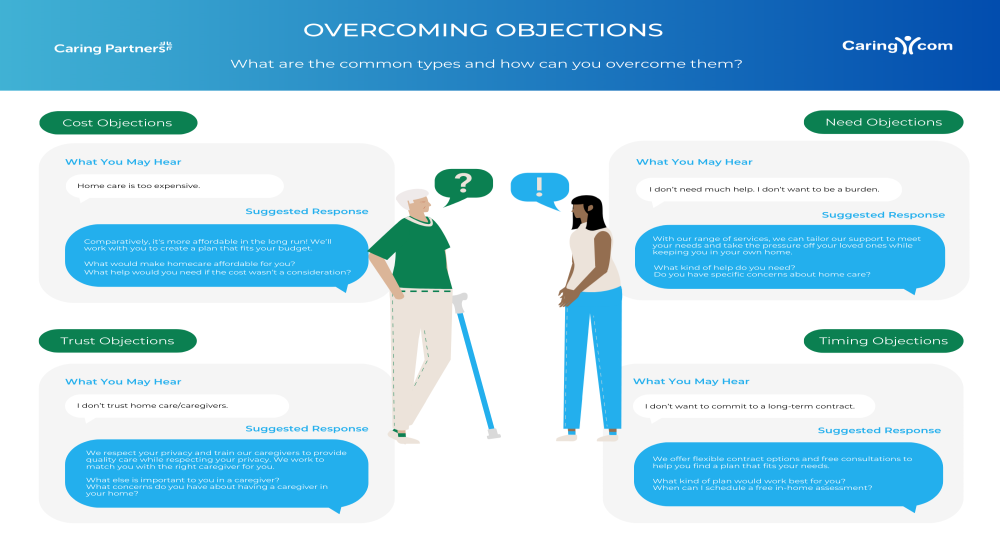Home Care Agencies
Sales Tips
Overcoming Objections: The Key to Building Trust in Home Care

Have you heard an objection from a potential client and were not sure how to respond? Being able to overcome these objections during the conversation is an essential step toward turning a potential client into an actual one. There are a few key steps to responding effectively to an objection - understand the reason, address the concern, and follow up with a question to continue the conversation.
The first step is to understand the underlying reason behind the objection. Yes, they may feel home care is expensive, but the underlying reason is that they do not realize the cost-benefit of home care. Once you understand the reason, then you can respond. The first part of your response should be a statement highlighting your understanding of their concern and facts to reassure their concern. The second part should be a follow-up question that redirects the conversation to the potential client and restarts the conversation.
We have listed out several common objection categories - Cost, Need, Trust, and Timing and some common objections you may hear, as well as recommended responses.
Cost Objections
Some of the most common objections you may hear are related to the cost of home care services. You may hear objections like:
"Home Care is too expensive."
Underlying Reason:
Lack of understanding of the cost-benefit of home care
How to Address:
"I understand that cost is a concern. However, compared to the cost of hospitalization or nursing home care, home care is actually more cost-effective in the long run."
Follow Up Question:
“If cost wasn’t a consideration, what help would you need?”
"We can't afford home care."
Underlying Reason:
Limited financial resources or lack of knowledge of payment options
How to Address:
"I understand that cost is a concern, but we have a range of affordable options, and we can work with you to create a plan that fits your budget."
Follow Up Question:
“We all have to live within a budget. What would make home care affordable for you?”
Need Objections
Another common type of objection you may hear involves whether or not they feel they need home care. You may hear objections like:
"I don't need home care yet."
Underlying Reason:
Fear of losing independence or denial of the need for assistance
How to Address:
"I completely understand your desire to maintain your independence. However, home care can provide you with the support you need to stay safe and comfortable in your own home."
Follow Up Question
“Everyone needs a little help now and again. What kind of support could you use?"
"We're not ready for home care."
Underlying Reason:
Fear of change
How to Address:
"Change can be scary, but we'll be with you every step of the way to ensure a smooth transition and provide the support you need. Home care allows you to remain in the comfort of your own home while receiving the support you need."
Follow Up Question
“We can assist with a schedule that works for you. What types of help would you need?”
"I don't need that much help."
Underlying Reason:
Lack of understanding of the range of services offered by home care
How to Address:
"Our caregivers can provide a range of services, from assistance with activities of daily living to medication management and transportation. We can tailor our services to meet your individual needs."
Follow Up Question
“Tell me a little about your day. What kind of things do you do?”
"I'm looking for assisted living."
Underlying Reason:
Lack of understanding of senior care options
How to Address:
“Many people prefer the familiarity and comfort of their own home, and the ability to maintain their independence.”
Follow Up Question
"Are there specific concerns you have about home care? What accommodations or modifications could we make to ensure you feel comfortable and safe receiving care at home?"
"My family can take care of me."
Underlying Reason:
Reluctance to burden family members or lack of understanding of the demands of caregiving
How to Address:
"While family care is important, it can also be very demanding and stressful. Home care can provide additional support to help ease the burden on your family members.”
Follow Up Question
“What if we meet with you and your family to do a free in-home assessment?"
"I don't want to be a burden."
Underlying Reason:
Reluctance to ask for help or guilt over needing assistance
How to Address:
"We understand that asking for help can be difficult. Our caregivers are trained to provide compassionate care and support."
Follow Up Question
“We are here to help you maintain your independence and quality of life. What do you enjoy doing?”
Trust Objections
An additional type of objection you may encounter is a trust objection. Some examples of trust objections you may hear are:
"I don't want a stranger in my home."
Underlying Reason:
Fear of invasion of privacy or lack of trust in caregivers
How to Address:
"We take great care in selecting and training our caregivers. Our caregivers are professional, compassionate, and respectful of your privacy."
Follow Up Question
“What specific concerns do you have about having a caregiver in your home?” "I don't want a stranger in my home."
"I don't trust home care agencies."
Underlying Reason:
Negative experiences with other agencies or lack of knowledge of agency qualifications
How to Address:
"We are a licensed and accredited home care agency with a proven track record of providing quality care."
Follow Up Question
“What do you need to know to feel more comfortable with us?”
"I'm not comfortable with a male/female caregiver."
Underlying Reason:
Personal preference or past negative experiences
How to Address:
"We understand the importance of matching our caregivers with your personal preferences. We can provide a male or female caregiver based on your comfort level."
Follow Up Question
“What else would you prefer in a caregiver?”
"I don't want to give up my privacy."
Underlying Reason:
Fear of losing privacy
How to Address:
"We respect your privacy and will work with you to ensure that your personal space is respected at all times."
Follow Up Question
“What else is important to you in a caregiver?”
"I'm concerned about the cultural fit of a caregiver."
Underlying Reason:
Uncertainty about compatibility
How to Address:
"We understand the importance of cultural sensitivity and will work with you to match you with a caregiver who empathizes with cultural background and values."
Follow Up Question
“What is important to you in a caregiver?”
"I'm concerned about the quality of care."
Underlying Reason:
Quality concerns
How to Address:
"We take great pride in providing high-quality care, and we have a proven track record of satisfied clients.”
Follow Up Question
“What else is important to you in a caregiver?”
Timing Objections
The fourth type of objection you may hear from potential clients is around timing. Some examples of timing objections you may hear include:
"I don't want to commit to a long-term contract."
Underlying Reason:
Fear of being locked into a contract or lack of knowledge of flexible contract options
How to Address:
"We offer flexible contract options, including short-term and as-needed care. We can work with you to find a plan that fits your needs."
Follow Up Question
“What kind of plan would work for you?"
"I'm not ready to make a decision."
Underlying Reason:
Procrastination, reluctance to commit, fear of change
How to Address:
“That's okay. We offer free consultations to help you determine whether our services would be a good fit for you. There’s no harm in learning more about what’s available.”
Follow Up Question
“When would you like to schedule a free in-home assessment?”
"Who are you? Why did you call me? I’m not interested."
Underlying Reason:
Fear of unknown caller
How to Address:
“We work with Caring.com. You or a loved one visited their website recently to learn about home care in your area.”
Follow Up Question
“Why did you start researching care options?”
Now that you have an understanding of a framework for responding to objections, you can use them while having conversations with potential clients. We also have included an infographic you can save to your phone or computer and reference during these conversations as well. If you have more questions or would like help from our team with converting clients, reach out to us at sales_homecare@caring.com.

You May Also Like This
Home Care Agencies
Sales Tips
Overcoming Objections: The Key to Building Trust in Home Care

Have you heard an objection from a potential client and were not sure how to respond? Being able to overcome these objections during the conversation is an essential step toward turning a potential client into an actual one. There are a few key steps to responding effectively to an objection - understand the reason, address the concern, and follow up with a question to continue the conversation.
The first step is to understand the underlying reason behind the objection. Yes, they may feel home care is expensive, but the underlying reason is that they do not realize the cost-benefit of home care. Once you understand the reason, then you can respond. The first part of your response should be a statement highlighting your understanding of their concern and facts to reassure their concern. The second part should be a follow-up question that redirects the conversation to the potential client and restarts the conversation.
We have listed out several common objection categories - Cost, Need, Trust, and Timing and some common objections you may hear, as well as recommended responses.
Cost Objections
Some of the most common objections you may hear are related to the cost of home care services. You may hear objections like:
"Home Care is too expensive."
Underlying Reason:
Lack of understanding of the cost-benefit of home care
How to Address:
"I understand that cost is a concern. However, compared to the cost of hospitalization or nursing home care, home care is actually more cost-effective in the long run."
Follow Up Question:
“If cost wasn’t a consideration, what help would you need?”
"We can't afford home care."
Underlying Reason:
Limited financial resources or lack of knowledge of payment options
How to Address:
"I understand that cost is a concern, but we have a range of affordable options, and we can work with you to create a plan that fits your budget."
Follow Up Question:
“We all have to live within a budget. What would make home care affordable for you?”
Need Objections
Another common type of objection you may hear involves whether or not they feel they need home care. You may hear objections like:
"I don't need home care yet."
Underlying Reason:
Fear of losing independence or denial of the need for assistance
How to Address:
"I completely understand your desire to maintain your independence. However, home care can provide you with the support you need to stay safe and comfortable in your own home."
Follow Up Question
“Everyone needs a little help now and again. What kind of support could you use?"
"We're not ready for home care."
Underlying Reason:
Fear of change
How to Address:
"Change can be scary, but we'll be with you every step of the way to ensure a smooth transition and provide the support you need. Home care allows you to remain in the comfort of your own home while receiving the support you need."
Follow Up Question
“We can assist with a schedule that works for you. What types of help would you need?”
"I don't need that much help."
Underlying Reason:
Lack of understanding of the range of services offered by home care
How to Address:
"Our caregivers can provide a range of services, from assistance with activities of daily living to medication management and transportation. We can tailor our services to meet your individual needs."
Follow Up Question
“Tell me a little about your day. What kind of things do you do?”
"I'm looking for assisted living."
Underlying Reason:
Lack of understanding of senior care options
How to Address:
“Many people prefer the familiarity and comfort of their own home, and the ability to maintain their independence.”
Follow Up Question
"Are there specific concerns you have about home care? What accommodations or modifications could we make to ensure you feel comfortable and safe receiving care at home?"
"My family can take care of me."
Underlying Reason:
Reluctance to burden family members or lack of understanding of the demands of caregiving
How to Address:
"While family care is important, it can also be very demanding and stressful. Home care can provide additional support to help ease the burden on your family members.”
Follow Up Question
“What if we meet with you and your family to do a free in-home assessment?"
"I don't want to be a burden."
Underlying Reason:
Reluctance to ask for help or guilt over needing assistance
How to Address:
"We understand that asking for help can be difficult. Our caregivers are trained to provide compassionate care and support."
Follow Up Question
“We are here to help you maintain your independence and quality of life. What do you enjoy doing?”
Trust Objections
An additional type of objection you may encounter is a trust objection. Some examples of trust objections you may hear are:
"I don't want a stranger in my home."
Underlying Reason:
Fear of invasion of privacy or lack of trust in caregivers
How to Address:
"We take great care in selecting and training our caregivers. Our caregivers are professional, compassionate, and respectful of your privacy."
Follow Up Question
“What specific concerns do you have about having a caregiver in your home?” "I don't want a stranger in my home."
"I don't trust home care agencies."
Underlying Reason:
Negative experiences with other agencies or lack of knowledge of agency qualifications
How to Address:
"We are a licensed and accredited home care agency with a proven track record of providing quality care."
Follow Up Question
“What do you need to know to feel more comfortable with us?”
"I'm not comfortable with a male/female caregiver."
Underlying Reason:
Personal preference or past negative experiences
How to Address:
"We understand the importance of matching our caregivers with your personal preferences. We can provide a male or female caregiver based on your comfort level."
Follow Up Question
“What else would you prefer in a caregiver?”
"I don't want to give up my privacy."
Underlying Reason:
Fear of losing privacy
How to Address:
"We respect your privacy and will work with you to ensure that your personal space is respected at all times."
Follow Up Question
“What else is important to you in a caregiver?”
"I'm concerned about the cultural fit of a caregiver."
Underlying Reason:
Uncertainty about compatibility
How to Address:
"We understand the importance of cultural sensitivity and will work with you to match you with a caregiver who empathizes with cultural background and values."
Follow Up Question
“What is important to you in a caregiver?”
"I'm concerned about the quality of care."
Underlying Reason:
Quality concerns
How to Address:
"We take great pride in providing high-quality care, and we have a proven track record of satisfied clients.”
Follow Up Question
“What else is important to you in a caregiver?”
Timing Objections
The fourth type of objection you may hear from potential clients is around timing. Some examples of timing objections you may hear include:
"I don't want to commit to a long-term contract."
Underlying Reason:
Fear of being locked into a contract or lack of knowledge of flexible contract options
How to Address:
"We offer flexible contract options, including short-term and as-needed care. We can work with you to find a plan that fits your needs."
Follow Up Question
“What kind of plan would work for you?"
"I'm not ready to make a decision."
Underlying Reason:
Procrastination, reluctance to commit, fear of change
How to Address:
“That's okay. We offer free consultations to help you determine whether our services would be a good fit for you. There’s no harm in learning more about what’s available.”
Follow Up Question
“When would you like to schedule a free in-home assessment?”
"Who are you? Why did you call me? I’m not interested."
Underlying Reason:
Fear of unknown caller
How to Address:
“We work with Caring.com. You or a loved one visited their website recently to learn about home care in your area.”
Follow Up Question
“Why did you start researching care options?”
Now that you have an understanding of a framework for responding to objections, you can use them while having conversations with potential clients. We also have included an infographic you can save to your phone or computer and reference during these conversations as well. If you have more questions or would like help from our team with converting clients, reach out to us at sales_homecare@caring.com.


